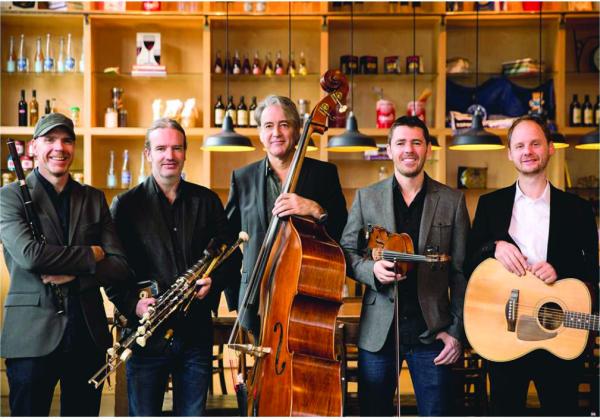February 27, 2019

It would seem like an unlikely collaboration: Lúnasa, the masterful traditional Irish band known for its enthralling, layered instrumental arrangements, and Natalie Merchant, who headed up the cornerstone alt-rock group 10,000 Maniacs for several years before branching out on her own as a singer-songwriter.
What’s more, the collaboration had its beginnings in an equally implausible setting: Hawaii, where Merchant saw the quintet perform some years ago and floated the idea while talking with them after the show.
“We were very happy to meet Natalie and to hear how much she liked our music,” recalls Kevin Crawford, who plays flute and whistle for Lúnasa. “She said, ‘We should work together sometime.’ And that’s always nice to hear, but you figure, well, probably not going to happen.
“But turns out she was serious about it.”
So serious, in fact, that Merchant invited the band to appear on her 2010 album, “Leave Your Sleep,” touching off a series of occasional get-togethers on stage or in recording studios – Merchant sang “The Bonny Light Horseman” on Lúnasa’s 2018 release, “Cas.” And on March 19, Merchant and Lúnasa will reunite again for a concert in Boston’s Wilbur Theatre.
The partnership between the band (whose other members include Cillian Vallely, uilleann pipes and whistles; Colin Farrell, fiddle; Trevor Hutchinson, double bass; Ed Boyd, guitar) and Merchant has grown and strengthened over time, explains Crawford, who acknowledges that he and his colleagues were a tad star-struck at the outset.
“Natalie was a huge figure in our musical development; we all grew up listening to her,” he says. “So we were slightly in awe of her at first, because she’s a superstar. And even now, she never ceases to amaze: She’s got such an amazing dynamic to her music, and she’s so passionate, totally in the moment.”
Although she gained initial renown as an alt-rock performer with a strident, sometimes gritty voice quality, Merchant as a solo artist showed herself to be interested in other genres of music, as demonstrated by her 2003 album, “The House Carpenter’s Daughter,” which featured traditional and contemporary folk songs like “Soldier, Soldier,” “Poor Wayfaring Stranger,” “House Carpenter” and “Crazy Man Michael.” Crawford and his bandmates were more than a little impressed at discovering this side of her: “She’s really been a huge fan of Irish singers and songs: Dolores Keane, Paul Brady – she’ll go line by line through their repertoires.”
After a few “one-off” appearances together, Merchant and Lúnasa went on a tour last year that took them through Ireland and then to New York City and the Albany area. It was a good bonding experience for all, says Crawford, and helped band and singer get better used to one another’s personal and musical styles.
“It’s definitely a different kind of gig. The five of us take our music seriously, but we don’t take ourselves seriously. With Natalie, we’re really trying to be on top of our form and deliver for her. And we didn’t want her to feel like a karaoke singer, but to put her stamp on the songs that we did, like ‘Bonny Light Horseman.’ We learned long ago to leave our egos at the door – if Natalie thought something could be explored further, and improved upon, then that was what we did.
“That’s what music is all about: You put yourself out there, let yourself be vulnerable, try not to think ‘Oh, wow, I’m in a room with Natalie Merchant,’ and let things flow. And she’s so honest and gracious, things went fine.”
Merchant is one of several vocalists Lúnasa has worked with in recent years, Crawford notes, and the experience has been enlightening for the band. “Ed and Trevor are used to accompanying songs, but for the band as a whole, there’s been a learning curve. We have arranged songlike sets before, added layers, intros and outros and so on. For songs, though, it’s a different kind of craft, and demands a subtlety in adding texture and color.“
For this go-round with Merchant, Lúnasa has extended itself beyond the traditional song domain. “We visited Natalie’s back catalog of material – ‘Motherland,’ for instance, and ‘Cowboy Romance,’ which is from her very first solo album – to find songs that really suited us,” says Crawford.
At the same time, the band reached further back into its own portfolio. “We dusted off some old sets we haven’t done in a while; Colin had never had an opportunity to play them with us. So whether you’re a Natalie Merchant fan or a Lúnasa fan, you’ll probably hear something familiar – maybe done in a different way than you might remember.”
For tickets and other information, go to thewilbur.com.

